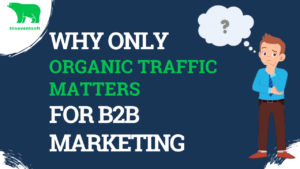Impact of iOS 14.5 release on B2B marketing
Last year, with iOS 14.5 release, Apple announced many exciting features such as Face unlocking with a mask on, support for PS5, etc. But the most critical point for marketers is Apple’s policy and restrictions on data privacy and tracking. Before iOS 14.5, advertisement agencies used to track certain end-user data using an identifier for advertisers ( IDFA). Data would include demographic attributes such as location, age, income level, etc. They would use the attributes to profile them, also known as attribution. And then, advertisers would use those profiles to target users with advertisements better.
After iOS 14.5, users choose to opt out of the IDFA-based tracking system. Every application and website opened in iOS (14.5 onwards) should ask for user consent to track users and their data. It looks something like the below:

User clicks on either:
- Allow: then tracking would happen like before
- Ask App not to follow: developers or advertisers of the app/websites cannot track how users consume their apps.
This means the Ads will not be very effective in the marketing ecosystem. From iOS 14.5, user data will become more restrictive and aggregated because:
- Advertisers will not have the ability to track their target audience, like who opted out, etc.
- If more people opt out, then user tracking will be difficult, and advertisers and marketers will find it difficult to optimize their ads with generic audience profiles.
With new regulations and GDPR policies, such elimination of specific data from various companies like Apple, Google, and Meta will be standard. In our opinion, the best channel to replace 3rd party data is Search. So marketers have to rely more on increasing their conversions through organic mediums to make up for the loss in advertisements.
How B2B marketers are using organic marketing to generate leads
Organic marketing is the new initiatives used by CMOs and product marketers across industries due to the new privacy regulation from Apple. Organizations have to build brands by creating content such as blogs, videos, product reviews, etc., for Google search, and leverage influencer marketing, partnerships marketing, and social media marketing.
The idea of building brand awareness and creating leads through organic marketing will need marketing organizations to re-imagine their content strategy. At Innoventsoft, we help our B2B clients figure out new and exciting ways of generating the same or better output for their marketing team.
1. Large B2B enterprises moving away from Ads
After increasing top-line goals from the marketing department in 2020, the demand-generation and product marketing team at a sizable B2B software organization sought new ways to achieve their KPIs. Their initial strategy was creating Ads to target the end audience (primarily developers and testers), which was affected by the iOS new release. They soon realized their Ad optimization exercise was not yielding results. So finally, they used Innoventsoft Intelligent Content Marketing (ICM) platform to ideate, strategize, and create content to build their brand in the Google search quickly. With the ICM platform, their target audience discovers their product in the Google search 1st page. This allowed their demand-generation team (both inbound and outbound) to create more inbound traffic and generate leads while collecting valuable personal information for further lead nurturing.
2. B2B startups changing relying on organic marketing
A leading SaaS startup based out of California, US, wanted to be less reliant on Ads. They realized that they are already getting more than 60% of their website traffic from Organic Search. Using the ICM platform, their digital marketing and marketing managers optimized their existing content further and created new content in the enterprise space. Their digital marketers placed new eBooks in various places suggested by the ICM platform. As a result, the product marketing team evolved their approach to create and promote content in Search rather than using Ads.
How to transform your B2B marketing with customer centricity and content
As Apple and Google take steps toward protecting user privacy, organic marketing becomes the center of the marketing team to connect with their customers, tracking specific KPIs and unlocking more ROI. When marketers leverage the ICM platform, they can easily understand the list of top content ( blogs, videos, and eBooks) to increase inbound traffic to their website. The most effective accelerator for product marketing, demand generation, and digital marketing team is to ensure they agree and concentrate on executing one strategy, i.e., organic marketing. They can also monitor and measure the output of the content strategy every week-on-week. As your team moves along in the maturing curve of organic marketing, you will discover insights and new patterns wrt to content and audience by the ICM platform. Your digital team can use these insights for remarketing ( placing ads for the folks who have previously visited your website).
So why wait? Achieve organic marketing for your organization by crafting a content strategy with the ICM platform. Design your content planning and ensure you are integrating it into your marketing plan to bring an impact on your brand and domain. If you are a product or digital marketer, then take the initiative with the demand-generation team to successfully create content for your customer in various buying cycle stages.
ICM helps you take that step to help your organization prepare well for current and upcoming changes in the marketing and advertising landscape.
For more information about our ICM platform, please contact us.





